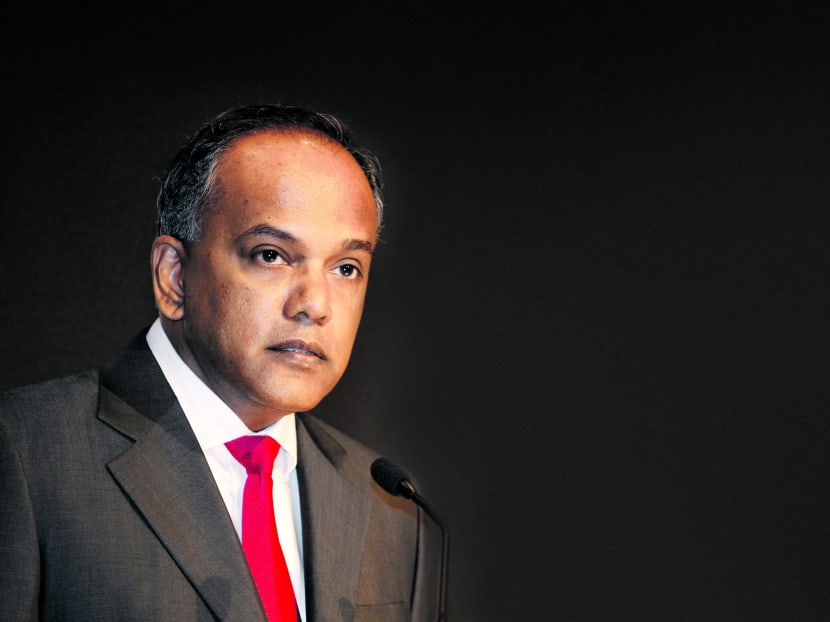Govt will provide direct legal aid to defendants in criminal cases
SINGAPORE — In a significant departure from its long-held stance towards legal aid for those accused of non-capital crimes, the Government will provide direct legal assistance and support to defendants in criminal cases, Law Minister K Shanmugam said yesterday.
SINGAPORE — In a significant departure from its long-held stance towards legal aid for those accused of non-capital crimes, the Government will provide direct legal assistance and support to defendants in criminal cases, Law Minister K Shanmugam said yesterday.
Currently, the Government provides legal aid indirectly through annual funding to the Law Society’s Pro Bono Services Office, which runs the Criminal Legal Aid Scheme (CLAS). The scheme is now set to be enhanced with more funding and a tiered structure providing a range of help — from general advice for all accused to full representation. The enhanced funding may also be used for honoria or disbursement for lawyers, who currently do not receive payment for their work for the CLAS.
The possibility of increasing funding for the CLAS was first mentioned in Parliament last month, and comes on the back of the Government extending civil legal aid to cover more people earlier this year.
Speaking at the Association of Muslim Lawyers’ Inaugural Lecture, Mr Shanmugam described the change as “a clear shift in philosophy” as society matures, and in line with views expressed during the Our Singapore Conversation sessions.
Singapore, he said, is now a more inclusive, compassionate society, citing other recent policy changes, such as the proposed universal healthcare and increases in childcare and infant care assistance.
It is estimated that at least half of the estimated 12,000 accused persons annually could benefit from some form of legal representation. Currently, the State only provides legal assistance for capital cases through the Supreme Court’s Legal Assistance Scheme for Capital Offences. The CLAS, which handles non-capital cases, receives some 1,000 applications each year, with about 200 to 300 applicants qualifying for aid.
Mr Shanmugam said the Government had previously been against the provision of criminal legal aid, as it would put the State “in the position of using public funds to both prosecute and defend the same accused persons, after significant resources had been allocated to the careful and meticulous investigation, assessment and conduct of prosecutions”.
Even with this shift in stance, care will be taken in how funds are spent — public funds cannot be used to support wealthy defendants and unmeritorious cases “where people fight because it’s free”, he said, noting that the United Kingdom and New Zealand have had to cut back on their escalating criminal legal aid funding.
An independent Criminal Legal Assistance Steering Committee would be set up to oversee policies governing the disbursement of funds, including the types of offences for which aid will be granted, and the nature of means testing and ensure that funds are used only to defend “reasonably deserving cases”, Mr Shanmugam said. The committee will be chaired by a High Court Judge and comprise representatives from the Courts, the Law Society and the Law Ministry.
Under the enhanced CLAS, the first tier of assistance will provide all accused persons with awareness of legal advice and representation channels, while the second tier will provide basic legal advice for accused persons facing jail terms. The third tier, which could benefit up to an estimated 3,000 accused persons, would involve more help, short of a court attendance by a lawyer. The fourth tier, estimated to assist up to 1,000 accused persons, would involve full representation.
The Law Society currently receives S$400,000 in public funding for its Pro Bono Services Office, which has some 300 lawyers volunteering regularly under the CLAS. It hopes to add another 200 lawyers to this pool with enhanced funding.
Asked about using funding for honoria or disbursements, Law Society Pro Bono Services Office Director Lim Tanguy said: “We will be able to do a lot more in terms of supporting our volunteer lawyers that will then enable them to provide more assistance for criminal legal aid.”
Criminal pro bono lawyers TODAY spoke to welcomed the Government’s shift in approach. Describing it as “a (historic) milestone in the criminal justice system,” Mr Josephus Tan, known for his pro bono work, felt the change was “a big step towards making our society a more gracious and compassionate one.”
CLAS Chairman Abraham Vergis said the challenge would be getting more lawyers to commit sufficient time to criminal legal aid work. “We simply don’t have enough volunteer lawyers currently to cope with the substantial number of needy and deserving cases in the Subordinate Courts that could have benefited from some form of legal representation,” he added.










